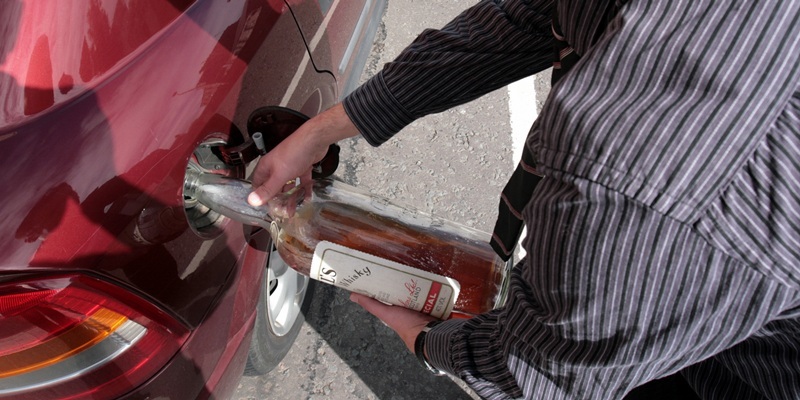Drink driving could take on a radical new meaning after boffins revealed audacious plans to radically slash carbon emissions through the use of “whisky-powered” cars.
It may sound like the kind of scheme normally outlined on April 1, but the proposal-drawn up by experts at Napier University-was last night hailed as a major breakthrough.
Those behind the new “super biofuel” insist it can be used in ordinary cars without the need for potentially expensive adaptions and claim it could be available on garage forecourts within a few years.
A patent has now been filed for the product, which is made entirely from whisky by-products.
Among those backing the plan is Dr Richard Dixon, director at Perthshire-based WWF Scotland.
“Scotch whisky is world renowned and one of Scotland’s biggest exports, so it is great to see plans that could not only help power the cars on our roads and reduce fossil-fuel emissions but also help reduce the environmental impacts of the industry itself,” he said.
“The production of some biofuels can cause massive environmental damage to forests and wildlife. As such, whisky-powered cars could help Scotland to avoid use of forest-trashing biofuels.”Whisky samplesScientists at Napier have spent two years hatching the plan, using various samples from Diageo’s Glenkinchie Distillery.
The £260,000 research project was funded by Scottish Enterprise’s Proof Of Concept programme.
Members of the Napier research team focused on the £4 billion whisky industry as a “ripe resource” for developing biobutanol-the next generation of biofuel which gives 30% more output power than ethanol.
It uses the two main by-products of the whisky production process-pot ale, the liquid left after distillation, and draff, the spent grains-as the basis for producing the butanol which can then be used as fuel.
With 1600 million litres of pot ale and 187,000 tonnes of draff produced by the malt whisky industry annually, experts claim there is “real potential” for the biofuel to be available at local garage forecourts alongside traditional fuels.
The university now plans to create a spin-out company to take the new fuel to market and promote the commercial opportunity, in a bid to make it available at petrol pumps.
Professor Martin Tangney, director of the biofuel research centre at Napier, is leading the groundbreaking research.
“The EU has declared that biofuels should account for 10% of total fuel sales by 2020,” he said. “We are committed to finding new, innovative renewable energy sources.
“While some energy companies are growing crops specifically to generate biofuel, we are investigating excess materials such as whisky by-products to develop them.This is a more environmentally sustainable option and potentially offers new revenue on the back of one Scotland’s biggest industries.”
He added, “We have worked with some of the country’s leading whisky producers to develop the process.””Pioneering research”Lena Wilson, chief executive of Scottish Enterprise, was happy to lend her support, saying, “This pioneering research is testament to Scotland’s world-class science base. By proactively taking innovative ideas from the laboratory to the global market place, Scotland can continue to compete at the highest level and successfully boost its economic recovery.”
Energy minister Jim Mather is similarly enthusiastic.
“This is an innovative development, and I am delighted to see Napier University once again display its expertise in this field by bringing this biofuel to market,” he said. “This innovative use of waste products demonstrates a new sustainable option for the biofuel industry.
“In these challenging economic times we need to play to our strengths and take advantage of the low carbon opportunities of the future.It is exactly this type of innovation that will help sustain economic recovery and deliver sustainable economic growth.”
Susan Morrison, director and general manager at The Scotch Whisky Experience, added, “Working in a tourism role to represent the whisky industry we are delighted that the green agenda is moving forward at such a pace, both through the Green Tourism Scheme and innovations such as this new whisky biofuel.”
The technology for developing bio-fuel from whisky was inspired from a 100-year-old process created by Chaim Weizmann, a Jewish refugee chemist in Manchester who studied the butanol fermentation as part of a programme to produce rubber synthetically.
The process was then used in explosives manufacture and helped win both world wars.
Given yesterday’s revelations, it seems the theory could now be put to a radical new, 21st century use.
